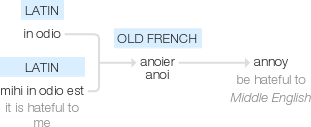Annoy
Middle English (in the sense ‘be hateful to’): from Old French anoier (verb), anoi (noun), based on Latin in odio in the phrase mihi in odio est ‘it is hateful to me’.
wiktionary
From Middle English anoyen, a borrowing from Anglo-Norman anuier, Old French enuier(“to molest, harm, tire”), from Late Latin inodiō(“cause aversion, make hateful”, verb), from the phrase in odiō(“hated”), from Latin odium(“hatred”). Doublet of ennui. Displaced native Middle English grillen(“to annoy, irritate”), from Old English grillan (see grill).
etymonline
annoy (v.)
late 13c., anoien, annuien, "to harm, hurt, injure; be troublesome or vexatious to, disquiet, upset," from Anglo-French anuier, Old French enoiier "to weary, vex, anger," anuier "be troublesome or irksome to;" according to French sources both from Late Latin inodiare "make loathsome," from Latin (esse) in odio "(it is to me) hateful," from ablative of odium "hatred," from PIE root *od- (2) "to hate" (see odium).
Also in Middle English as a noun, "feeling of irritation, displeasure, distaste" (c. 1200, still in Shakespeare), from Old French enoi, anoi "annoyance;" the same French word was borrowed into English later in a different sense as ennui. And compare Spanish enojo "offense, injury, anger;" enojar "to molest, trouble, vex." Middle English also had annoyful and annoyous (both late 14c.).
